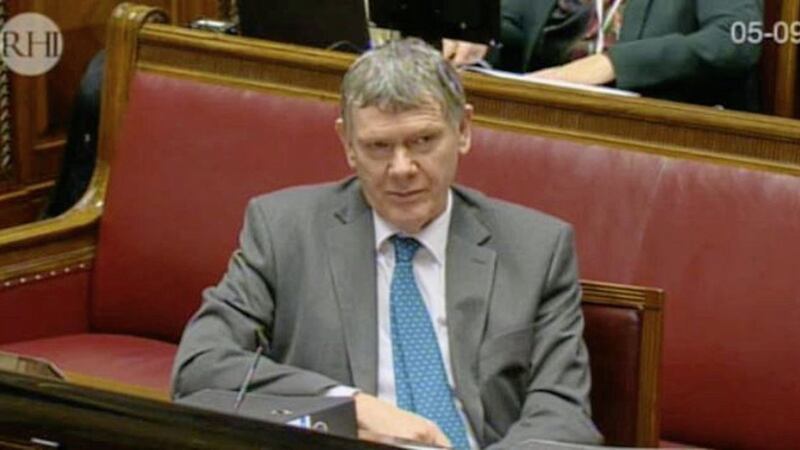A SENIOR civil servant yesterday denied a suggestion from former DUP minister Jonathan Bell that several party advisers did not "wish the RHI scheme to be on the agenda" during meetings.
Dr Andrew McCormick, former Department of Enterprise Trade and Investment (Deti) permanent secretary, told the RHI Inquiry he did not "recall any resistance" from DUP special advisers.
Mr Bell has claimed in his witness statement that his special adviser, Timothy Cairns, said several DUP advisers did not "wish the RHI scheme to be on the agenda".
But Dr McCormick told the inquiry yesterday: "That's the kind of thing I would remember".
During his second day of evidence, Dr McCormick also said there was "no good reasoning" why the details about the overspend of the botched renewable energy scheme were not given to Mr Bell after he took up his post.
Dr McCormick took part in a meeting in June 2015 with Mr Bell following his appointment, along with other department senior managers.
Mr Bell, in his written evidence to the inquiry, said the specifics about the RHI scheme's overspend were not drawn to his attention, even though by that stage the problems it had encountered were needing urgent attention.
Read More:
- RHI Inquiry Live: Jonathan Bell gives evidence
- DUP spad mocked Jonathan Bell after he 'cried on Peter Robinson's shoulder'
- Sinn Féin pressed to keep RHI scheme open
- Jonathan Bell refutes his former spad's 'bullying' claims
- David Sterling feared RHI would damage his career, Jonathan Bell claims
Asked was there any reluctance to greet Mr Bell with a problem when he was new to the job, Dr McCormick replied "no, it's impossible to get the right response if you gloss over the central issues".
Dr McCormick was also asked yesterday for his thoughts on the relationship between Mr Bell and Mr Cairns.
It comes after the ex-Spad made allegations of bullying against Mr Bell, including a claim that the former minister tried to break his finger and swung a punch at him.
He said while he was "certainly aware there was a real difficulty in the relationship" between the two men, he did not witness Mr Bell acting in a bullying manner or that Mr Cairns had not approached him about it.
Mr Cairns claims he brought concerns to Dr McCormick over Mr Bell's behaviour, but the civil servant told the inquiry: "I think I would remember him saying you need to help me with a bullying problem".
However, he said there was a "pretty sharp" exchange between Mr Bell and his adviser over breakfast in London in June 2015, but he did not see anything from either man that was threatening or intimidating.
He said there was a difference of agreement between Mr Bell and Mr Cairns about the ability to take decisions without consulting with other people within the party.
"I think I said 'do you not need to take this to the First Minister', or something to that effect," Dr McCormick said.
"Jonathan Bell said 'I'm the minister I'll take the decision', Timothy Cairns said you'll have to take that to party colleagues.
"Tim Cairns's intervention was a sharper rebuke to a minister from a special adviser than I'd seen before, the tone the language was terse and pointed and right at the borderline of normal conversation if not a bit over it.
"It wasn't long before we realised this was not for us to be involved in and we were either asked to leave or got up and left."
Dr McCormick also told the inquiry it was "glaringly obvious" that warnings from whistleblower Janette O'Hagan about key flaws in the scheme "should have been acted on".
He said he "can't see any defensible explanation" about why the concerns were not considered earlier after she had exposed a "fundamental error" that the scheme tariffs were wrong.
Dr McCormick also said he "deeply regrets not asking more questions" about the flawed scheme and said by the time he became involved with the scheme "we were past risk... things had crystallised and had gone wrong".
"They were no longer risks....they were actualities," he said.
He also said monitoring of the scheme was not adequate.
"I don't see any good explanation for that," he said.
"This is clearly identified as something that needed to be followed up. Indeed it is getting into conditions of approval back at the initiation of the scheme.
"I can't understand how these clear mitigation measures were not routinely followed through."








